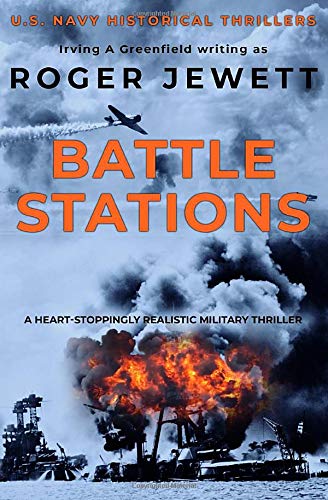Battle Stations
Navy Captain Andrew Troost is a consummate professional bound for high command, but is married to his career more than to his alcoholic, distrustful wife, Gloria. In late 1941, America is gearing up for war. Troost’s son Warren is following in his father’s footsteps. Through happenstance he and three other young officers—Jacob Miller, Tony Trapasso, and Glen Lascomb—find their lives intertwined in the hectic first two years of the war. As each man confronts danger and duty in separate campaigns, they depend on one another’s support to fight the war and find a future with the women they love.
Jewett’s approach with the book is reminiscent of War and Remembrance by master novelist Herman Wouk. Several problems, however, prevent Battle Stations from approaching the level of Wouk’s novel. Accuracy is essential for military novels, and Jewett’s book displays a number of inaccuracies in shipboard routine and terminology. For example, in one spot a lieutenant is operating the engine order telegraph; in reality, this is a lower enlisted man’s job. Another example is incorrect terminology used by Andrew Troost when talking on the ship’s radiotelephone. These seemingly small mistakes detract from the novel’s authenticity and pull some readers out of the story.
A more significant shortcoming is the limited depth to which Jewett develops the characters. Instead of focusing on one or two of the officers, the author shifts from one to another among the five, not going deeply into any of them. Events in the plot—primarily battles—likewise are underdeveloped and seem rushed, preventing the buildup of sufficient tension and suspense. Overall, the book, although enjoyable, is likely to leave readers unsatisfied.










